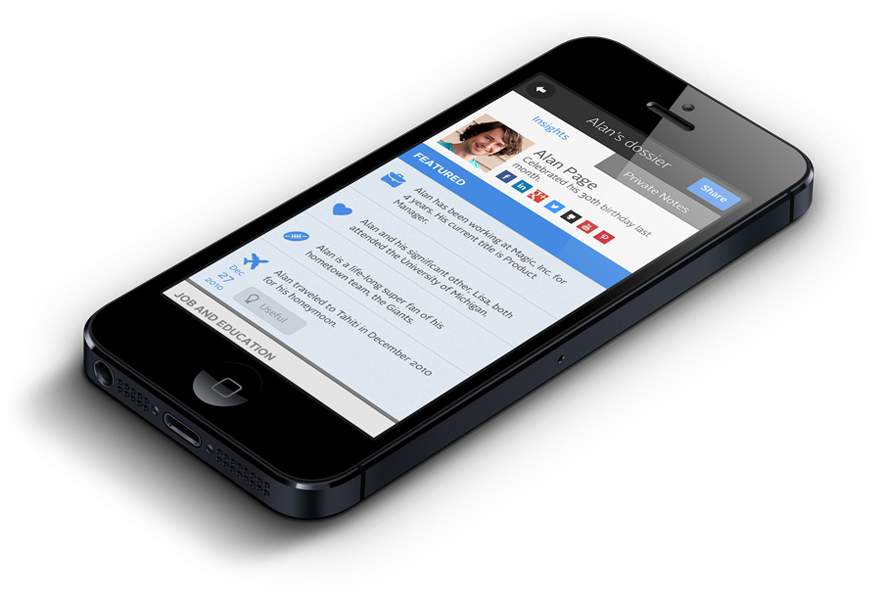How I Refresh my memory

My friend Paul Tyma (ex-Google, creator of Mailinator, occasional stand-up comic) released a mobile product this week and one thing I find interesting is the difference between how he describes it and how I describe it.
Paul: "Let’s say you had an important meeting with someone you really want to impress. A smart person would probably spend a non-trivial amount of time scouring the Internet for information about that person. What are they tweeting about? If you’re LinkedIn to them, then go check out their LinkedIn profile. If you were really interested you might go look up their house on Zillow. Or see how their company’s stock price faired today on Yahoo Finance".
Bob: "Let’s say you are nosy and want to know a lot about someone, anyone, and prefer to get that information through a Mission Impossible interface".
My version’s better, right? More honest, if a little creepy?
Either way you start it here’s the point: every time you put something on the net it becomes part of your personal Internet record. The cost of processing is now low enough and our prurient interest is high enough that we’re beginning to see intelligent apps that can find this information for you (or about you) in real time.
Paul’s product, called Refresh, is one of those. At the moment it is solely an iOS app. Refresh, which you can download for free from Apple’s App Store, examines your calendar, figures out who you are meeting, then 15 minutes before the meeting sends you a push notification to examine that person’s dossier.
"Your dossier, Mr. Cringely".
I generally hate phone notifications, but I don’t hate these because they are always relevant, just-in-time, and have already kept me from forgetting meetings entirely (I was a beta tester of this app, can you tell?).
Refresh scours dozens of data sources to create a dossier about the person you are meeting or the person you’d like to meet sitting at the end of the bar.
If you know their name, Refresh can generally figure out who they are even if there are dozens of other people with the same name (serious data mining mojo, that). It will tell you where they went to school, the name of their significant other, work history, what he or she likes to do, what teams they root for, how their company is doing financially, their latest blog post, among other things.
Refresh dossiers are not static -- they are generated on-the-fly in real time and represent the intersection between two social data sets -- yours and the other person’s. Going a step further, Refresh -- like the briefing cards for any talk show host -- will suggest good questions like "how was your trip to Disneyland?" The creepy/cool part about this question is it’s dependent on Refresh’s knowledge not just of the other guy but also of me, because it knows I took my family to Disneyland recently, so this could be good conversational territory.
Paul assures me that user privacy is a top priority and absolutely no information is provided that you don’t already have access to. If I were Facebook friends with the person I wanted to know about, then I’d see information from his Facebook. If I wasn’t Facebook friends with him, I wouldn’t.
This thing works. But should I use it or run away from it? Good question. I’ll answer that in two parts.
First consider the tech, which is simple on the outside and astounding on the inside. Refresh was not easy to do. It doesn’t depend solely on computers being really fast, though I suppose it doesn’t hurt. Why else would there be entire companies built around Ruby?
Refresh lives in a domain where all data is fuzzy. All of it. The application can count on nothing. Facebook says I’m Bob. LinkedIn says I’m Robert. and Foursquare says I’m, well I’m not going to tell you what Foursquare says I am, but it’s not a name my mother would find funny.
Every major component of Refresh is a fuzzy system. When it sees "Lunch with Tom" -- without exaggeration 100 bots go out and vote who Tom is. One says "You have a Facebook friend named Tom". One says "You met with a Tom person 3 months ago at the same location". One says "It’s not your cousin Tom -- you hate him". Some are heuristic and some are statistical.
The same goes for insights -- hundreds of bots -- and for figuring out Bob is the same Bob on Facebook and LinkedIn.
If you’ve downloaded the app by this time you’ll see it has access to all your other apps. How does Refresh keep users safe?
Apart from user logins the app doesn’t store anything about people. All the personal information is gathered anew each time from the original sources. If people ask Refresh to delete their data, there’s almost nothing to delete. So privacy is at the data provider level. LinkedIn, for example, definitely lets you make data private to third-party apps. Other apps don’t allow that.
In the bigger sense privacy has become somewhat futile. My 89 year-old mother, for example, will probably never figure out Facebook privacy settings.
I have chosen to use this app because I find it useful and because I see this as a sort of arms race and Refresh is my weapon of choice. It helps me know more than the other guy.
As long as I participate in social media services, well I’m already in over my head. Given that I am a public person living a public life, my position is that my best defense is a good offense. And as a tool to help me figure out who and what I am dealing with on a daily basis, Refresh is more than worth the risk.